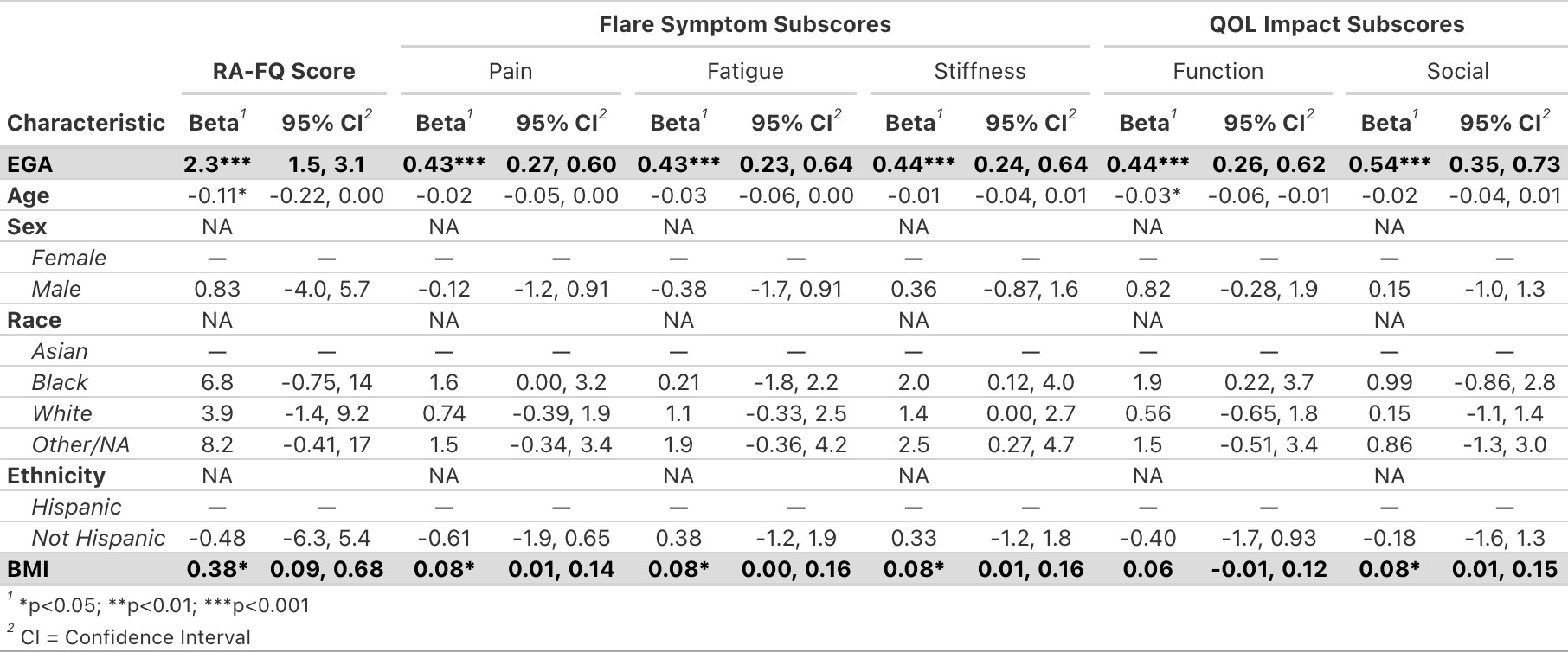Session Information
Date: Sunday, November 12, 2023
Title: (0380–0422) RA – Diagnosis, Manifestations, and Outcomes Poster I
Session Type: Poster Session A
Session Time: 9:00AM-11:00AM
Background/Purpose: Elevated BMI has been previously associated with lower RA remission rates and underascertainment of swollen joint counts.1,2 However, a knowledge gap persists regarding the potential impact of elevated BMI on the severity of RA flare symptoms and their effects on quality of life (QOL). Our study addresses this gap, evaluating the influence of BMI on RA flare symptoms and QOL.
Methods: Participants with ≥2 swollen joints and Early/Recent Onset RA (symptoms ≤12/≤24 months) were recruited into the Consortium of Early ArThritis CoHorts-USA Study (CATCH-US) at two centers (New York, Baltimore) between December 2014 and May 2023. Baseline characteristics and patient reported outcomes (PROs) were recorded at each visit. Flares were determined using the OMERACT RA-Flare Questionnaire (RA-FQ), a PRO that assesses symptoms of Pain, Stiffness, Fatigue, and impacts on Physical Function and Social Participation (items scored from 0 to 10; best to worst); all five scores are summed for an overall score range of 0 to 50. An Evaluator Global Assessment (EGA) score, indicating RA clinical disease activity, was scored by the enrolling rheumatologist between 0 (not active) and 10 (very active). Using a multivariable linear regression model, we tested the correlation between BMI and RA-FQ scores, considering EGA scores and demographic factors as covariates.
Results: Eligible participants (n=134) were mostly female (85%), white (71%), and non-Hispanic (87%); almost half were overweight or obese (46%); median age was 47.3 years and median BMI was 24.3 (Table 1). Higher EGA scores (β = 2.3; p < .001) and elevated BMI (β = 0.38; p = .01) emerged as significant predictors of higher RA-FQ scores; EGA was also significantly associated with each RA-FQ subscore, while BMI was significantly associated with four of the five subscores (Table 2). We observed an amplified impact of elevated BMI on RA-FQ scores in obese patients compared to those in healthy weight and overweight categories (Figure 1). Age was inversely related to the total RA-FQ score (β = -0.11; p = .04) and Function subscore (β = -0.03; p = .01). No significant associations were found for sex, race, or ethnicity.
Conclusion: Our findings underscore a strong correlation between EGA scores and RA-FQ scores, thereby establishing the concordance of this PRO with clinically assessed disease activity. More importantly, we found that elevated BMI is associated with more severe flare activity and diminished QOL, particularly in obese ERA patients. This result corroborates earlier studies that suggested a systematic underestimation of disease activity in patients with elevated BMI. As such, clinicians should consider patients’ BMI and RA-FQ scores when formulating treatment plans for RA flares. Future research will focus on longitudinal analyses to assess the persistence of these associations throughout the course of the disease.
References:
1. Schulman, E., et al, Arthritis Care Res (Hoboken), 2018.70(8)
2. Bauer, E.M., et al. BMC Musculoskelet Disord, 2017.18(1)
To cite this abstract in AMA style:
Butler M, Aude C, Bingham C, Bykerk V. Obesity Is Associated with Worse Flare Symptoms and Quality of Life in Early Rheumatoid Arthritis: Insights from the RA Flare Questionnaire [abstract]. Arthritis Rheumatol. 2023; 75 (suppl 9). https://acrabstracts.org/abstract/obesity-is-associated-with-worse-flare-symptoms-and-quality-of-life-in-early-rheumatoid-arthritis-insights-from-the-ra-flare-questionnaire/. Accessed .« Back to ACR Convergence 2023
ACR Meeting Abstracts - https://acrabstracts.org/abstract/obesity-is-associated-with-worse-flare-symptoms-and-quality-of-life-in-early-rheumatoid-arthritis-insights-from-the-ra-flare-questionnaire/



